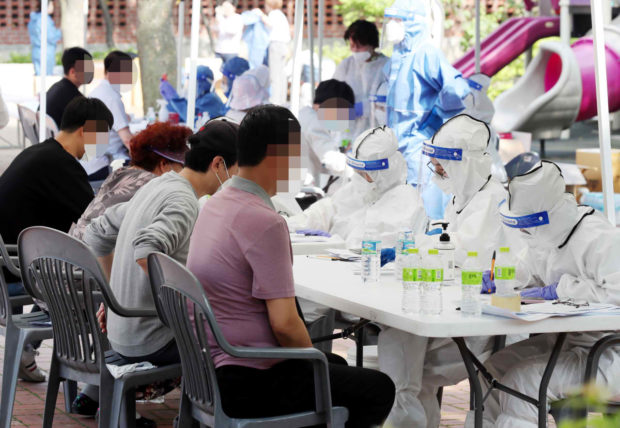Greater Seoul under threat of further spread, high alert over ‘silent’ virus spreaders
SEOUL — New virus cases in greater Seoul continued to rise Thursday amid a steady increase in cases linked to religious gatherings, putting health authorities on high alert over further spread in the densely populated metropolitan area amid concerns over asymptomatic “silent” virus spreaders.
The country added 39 more cases of the new coronavirus, including 33 local infections, raising the total caseload to 11,629, according to the Korea Centers for Disease Control and Prevention (KCDC).
All of the newly identified domestic transmissions were reported in Seoul and adjacent areas.
A day earlier, the country reported 49 COVID-19 cases, snapping four consecutive days of fewer than 40 new infections.
Church-linked transmissions in Seoul and surrounding areas have been a new source of concern for health authorities, along with cases from clubgoers in the nightlife district of Itaewon and an e-commerce giant’s warehouse.
Article continues after this advertisementAs of Thursday, the number of cases tied to 30 small churches in Incheon, west of Seoul, and Gyeonggi Province that surrounds the capital city reached 63, up 10 from a day earlier, according to the KCDC.
Article continues after this advertisementOf the cases reported from the churches, more than half were secondary transmissions.
The number of infections from clubgoers in Itaewon reached 272, and 119 cases were linked to the distribution center run by Coupang as of Wednesday.
Health authorities are particularly concerned about a steady rise in “hidden, silent” virus spreaders in the metropolitan area, as those who come into contact with such people are at risk of contracting COVID-19 unwittingly from asymptomatic virus carriers.
The KCDC estimates around 25-35 percent of patients here tested positive for the coronavirus despite showing no related symptoms.
A large number of the patients linked to church gatherings have shown mild or no symptoms. Some 70 percent of the patients reported from one of the churches in Incheon showed no signs of the virus as well, according to the KCDC.
“It is possible that South Korea may continue to experience the sporadic spread of the virus through such silent virus spreaders until an effective vaccine becomes available,” Yoon Tae-ho, a senior health official, said in a daily briefing.
Yoon stressed that residents of the metropolitan area should refrain from having gatherings at least until the weekend.
A spate of cluster infections has forced health authorities to enhance quarantine measures in the metropolitan area, home to half of the country’s 50 million population, which will be in place until June 14.
South Korea may consider going back to strict social distancing if the country’s virus curve does not sharply flatten by the deadline.
In sync with eased social distancing that began in early May, South Korea rolled out the third phase of its plan to reopen schools, with first-year high school students, second-year middle school students and other selected elementary school students returning to their classrooms.
Schools will continue taking precautionary measures, including staggered lunches, adjusting student attendance, reduced class time, and a mix of online and offline classes.
But some schools, most of them located in the metropolitan area, were forced to delay their reopening as concerns linger.
On Wednesday, some 830 kindergartens, elementary, middle, and high schools remained shut down, accounting for 4 percent of the country’s 29,000 schools.
The country reported no new deaths, keeping the death toll at 273.
The fatality rate stood at 2.35 percent, though the figure hovered at over 26 percent for patients aged 80 and above.
The accumulated number of imported cases reached 1,275, up six from a day earlier.
The total number of people released from quarantine after full recoveries stood at 10,499, moving up 32 from the previous day. Around 90 percent of local COVID-19 patients have been cured, according to the KCDC.
Since Jan. 3, South Korea has carried out 973,858 COVID-19 tests, including 17,006 a day earlier. The country reported its first case, involving a Chinese person, on Jan. 20. Yonhap
For more news about the novel coronavirus click here.
What you need to know about Coronavirus.
For more information on COVID-19, call the DOH Hotline: (02) 86517800 local 1149/1150.
The Inquirer Foundation supports our healthcare frontliners and is still accepting cash donations to be deposited at Banco de Oro (BDO) current account #007960018860 or donate through PayMaya using this link.
